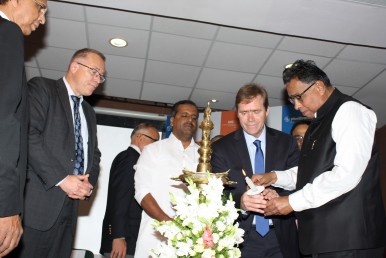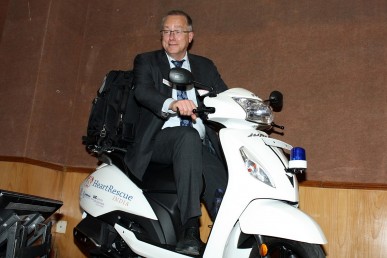UIC, partners launch HeartRescue India to lower cardiac death rate
The University of Illinois at Chicago, M.S. Ramaiah Medical College and Memorial Hospital of Bangalore, India, and Medtronic announced the launch of HeartRescue India. The first-of-its-kind, $4.4 million, five-year collaboration funded by Medtronic Philanthropy supports community-based projects in Bangalore to lower deaths due to sudden cardiac arrest.

Dr. Terry Vanden Hoek, head of emergency medicine in the UIC College of Medicine and investigator on the HeartRescue India grant; Dr. Timothy Erickson, head of the UIC Center for Global Health (second from right) and Dr. M. R. Jayaram, Chancellor, M. S. Ramaiah Medical College (far right) commemorate the launch of HeartRescue India at a ceremony in at the medical college in Bangalore.
India has more cardiovascular disease than any country in the world. Heart attacks claim 4 to 5 million people annually. Up to 4 percent of Indians in rural areas and up to 10 percent in cities have coronary artery disease, one of the leading causes of sudden cardiac arrest.
Partner organizations of HeartRescue India, which include Research Triangle Institute International and the Institute for Health Metrics and Evaluation at the University of Washington, will work on community outreach efforts to teach the signs and symptoms of sudden cardiac arrest; how to perform life-saving CPR; and how to call for help in an emergency.
Dr. Timothy Erickson, head of the UIC Center for Global Health; Bellur Prabhakar, associate dean for technological innovation and training in the UIC College of Medicine; and Dr. Terry Vanden Hoek, head of emergency medicine in the UIC College of Medicine, will coordinate UIC’s partnership with M.S. Ramaiah Medical College to provide emergency care expertise.
“One of the cornerstones of the program is training citizens in how to perform compression-only CPR – a simple technique to learn, and the best way a bystander can help save the life of someone experiencing sudden cardiac arrest,” says Vanden Hoek, an investigator on the HeartRescue India grant.

Dr. Terry Vanden Hoek on one of the HeartRescue India mopeds that will be used to get life-saving AEDs to cardiac arrest patients in Bangalore.
Vanden Hoek leads Illinois Heart Rescue, a similar program funded by Medtronic Philanthropy that includes more than 50 hospitals throughout the state and emergency medical systems. In the two years since the program launched, survival for sudden cardiac arrest in Illinois jumped from 2 percent to 12 percent.
HeartRescue India will work to improve ambulance services to people’s homes for acute cardiac events.
“Ambulances are currently used to transport trauma patients between hospitals,” Vanden Hoek said. “We can improve survival for heart attacks by using them to bring patients that need critical care to the hospital.”
“We believe we can radically boost the number of patients who receive timely, effective care, and ultimately save many more lives in the process,” said Dr. Aruna Ramesh, head of emergency medicine and trauma at MS Ramaiah Hospital, and the principal investigator on the HeartRescue India program.
“Improving access to health care is at the core of what we do,” says Milind Shah, vice president of South Asia, managing director of Medtronic India and a board member of Medtronic Philanthropy. “Our global and local partnerships lead to a strengthened continuum of care for the patients we serve, which in turn leads to better outcomes and healthier communities.”
HeartRescue India will identify barriers to care and gaps in service and work with local leaders to draft policy and regulations to improve existing systems and guide the development of community-based programs. HeartRescue India will develop a standardized data registry to enable Bangalore health care workers, emergency responders and others to input information about sudden cardiac arrests.
“We want to know how our program is improving outcomes, but we need to know where we start from,” Vanden Hoek said. Two examples of needed data he cited are how long it takes to get a patient to the catheterization lab, and the 30-day outcomes for patients discharged after sudden cardiac arrest. “These are measures we need in order to gauge where we are doing things right, going forward, and ways we can adapt or improve our programs and outreach,” he said.
Medtronic, headquartered in Dublin, Ireland, is a leader in the development of medical technology. Medtronic Philanthropy focuses on expanding access to care for underserved populations worldwide.
M.S. Ramaiah Medical College is ranked 12th among 385 medical colleges in India. It has two major hospitals in Bangalore and two in rural settings.
UIC, one of the top 60 research universities in the United States, is Chicago’s largest university and one of the nation’s most diverse. Deeply committed to its urban mission, UIC is a leader in teaching, research, clinical practice and outreach aimed at eliminating disparities in health, education and economic opportunity. Its 15 colleges include the nation’s largest college of medicine and six other health sciences colleges, as well as regional health science campuses in Peoria, Rockford, Urbana-Champaign and the Quad Cities.
Categories
Faculty, Patient Care, UI Hospital
Topics
CPR, global health, heart attack, India, sudden cardiac arrest
